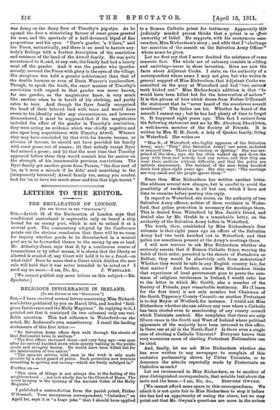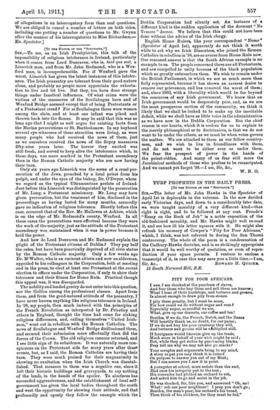RELIGIOUS INTOLERANCE IN IRELAND.
[To THE EDITOR OP THE " SPECTATOR."] SIR, —I have received several letters concerning Miss Richard- son's letter published by you on March 18th, and headed "Reli- gious Intolerance and the Molly Maguires." In replying to it, I pointed out that it contained (in two columns) only one veri- fiable assertion. This had reference to Waterford—as she noted, Mr. Redmond's own constituency. I recall the leading statements of this first letter :— " No Salvation Army officer dare walk through the streets of that Nationalist town in uniform:'
" The first officer stationed there—not very long ago—was soon after his arrival knocked down while quietly walking in the-public street and savagely beaten. Ho would have been killed but for the intervention of two sailors."
" The open-air service held once in the week is only made possible by a strict guard of police. Such protection now restricts assaulting to spitting and cursing—which are freely indulged in."
Further on :—
"This state of things is not always due to the feeling of the neighbourhood . . . nor is it wholly due to the Church of Rome. The worst tyranny is the tyranny of the Ancient Order of the Molly Maguires: I published a contradiction from the parish priest, Father O'Donnell. Your anonymous correspondent, " Onlooker," on April 1st, says it is "a huge joke" that I should have applied to a Roman Catholic priest for testimony. Apparently this judicially minded person thinks that a priest is ex officio unworthy of belief. He supports, with his anonymous asse- veration, Miss Richardson's story ; and adds that I "challenge her assertion of the assault on the Salvation Army Officer"
whose name he gives.
Let me first say that I never doubted the existence of some concrete fact. The whole art of calumny consists in adding and omitting—never in sheer invention. Here are now the facts about Adjutant Cooke. I state, on the authority of a correspondent whose name I may not give, but who writes in
general support of Miss Richardson, that Adjutant Cooke wat assaulted on the quay at Waterford and had "two natural teeth kicked out." Miss Richardson's addition is that " he would have been killed but for the intervention of sailors." It is this phrase of hers which draws from Father O'Donnell the statement that he " never heard of the murderous assault mentioned." The italics are his. Whether be heard of the assault I cannot say ; bat he has had plenty of time to forget it. It happened eight years ago. This fact I extract from the following statement sent me by Mr. Abraham Shackleton, a well-known member of the Society of Friends. It is written by Mrs. H. M. Jacob, a lady of Quaker family, living in Waterford. She writes
"Miss B., of Waterford, who highly approves of the Salvation Army, says : They' (the Salvation Army) are never molested or annoyed here. There is no cursing or spitting.' She was sur- prised at the idea; says she has often walked up and down the quay with them and nobody took any notice, and that they can wear their uniform without difficulty, and that the police are entirely unnecessary. The incident of the man being knocked down took place eight years ago. She also says : The meetings are very small and the people ignore them."
Since then Miss Richardson has written another letter. She adduces several new charges, but is careful to avoid the possibility of verification in all but one, which I have not time to examine before posting this reply.
In regard to Waterford, she states, on the authority of two Salvation Army officers, neither of them residents in Water- ford, that police protection is necessary for meetings there.
This is denied from Waterford by Mrs. Jacob's friend, and denied also by Mr. Grubb in a remarkable letter, on the authority of the Salvation Army ladies in Waterford.
The truth, then, established by Miss Richardson's four columns is that eight years ago an officer of the Salvation Army had two teeth knocked out in Waterford, and that police are sometimes present at the Army's meetings there.
I will now venture to ask Miss Richardson whether she
seriously asserts that if Roman Catholic friars, wearing the habit of their order, preached in the streets of Portadown or Belfast, they would be absolutely safe from molestation? Whether they would be safe in any English country fair, for that matter ? And further, since Miss Richardson thinks that experience of local government goes to prove the exis- tence of religious intolerance in Ireland, I would refer her to the letter in which Mr. Grubb, also a member of the Society of Friends, pays remarkable testimony. He (I learn for the first time) is not only member but Chairman of the South Tipperary County Council—as another Protestant is to-day Mayor of Wexford, for instance. I would ask Miss Richardson whether she can adduce any case where a Catholic has been elected even to membership of any county council which Unionists control. She complains that there are only fifteen cases in the South and West of Ireland where political opponents of the majority have been returned to this office.
Is there one at all in the North-East ? Is there even a single case of electing a Catholic Unionist? Everyone knows that very numerous cases of electing Protestant Nationalists can
be cited.
And, finally, let me ask Miss Richardson whether she has ever written to any newspaper to complain of this
exclusive partisanship shown by Ulster Unionists, or to denounce the attacks repeatedly made by Protestants on Catholics as such?
Let me recommend to Miss Richardson, as to another of your distinguished correspondents, that notable text about the
mote and the beam.—I am, Sir, Sze., STEPHEN GWYNN.
[We cannot afford more space to this correspondence. We admit it is not quite fair to Miss Richardson to stop it before she has had an opportunity of seeing the above, but we may point oat that Mr. Gwynn's questions are more in the nature of allegations in an interrogatory form than real questions. We are obliged to cancel a number of letters on both sides, including one putting a number of questions to Mr. Gwynn after the manner of his interrogatories to Miss Richardson.— ED. Spectator.]





































 Previous page
Previous page